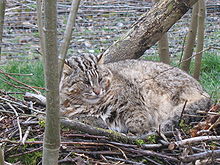Leopard cat
The leopard cat (Prionailurus bengalensis) is a small wild cat of South and East Asia. Since 2002 it has been listed as least concern by IUCN. It is widely distributed, but habitat loss and hunting occurs in places. There are twelve leopard cat subspecies, which differ widely in appearance[1] and were once thought to be separate species. The Sunda Leopard Cat is accepted as a species.
| Leopard cat | |
|---|---|

| |
| Indian leopard cat (P. b. bengalensis) | |

| |
| Amur leopard cat (P. b. euptilura) both at the Parc des Félins | |
| Scientific classification | |
| Domain: | Eukaryota |
| Kingdom: | Animalia |
| Phylum: | Chordata |
| Class: | Mammalia |
| Order: | Carnivora |
| Suborder: | Feliformia |
| Family: | Felidae |
| Subfamily: | Felinae |
| Genus: | Prionailurus |
| Species: | P. bengalensis
|
| Binomial name | |
| Prionailurus bengalensis (Kerr, 1792)
| |

| |
| Distribution of leopard cat, 2015[1] | |
The small cat is similar to the domestic cat but with longer legs. It is not closely related to the leopard but has leopard-like spots.
Distribution
changeLeopard cats are the most widely distributed Asian small cats. Their range extends from the Russian Far East, Korea, China, Indochina, the Indian subcontinent, northern Pakistan, the Philippines and the Sunda Islands of Indonesia.
They prefer forested habitats, but are found in agriculturally used areas. They live in tropical evergreen rainforests and plantations at sea level, and in subtropical deciduous and conifer forests in the foothills of the Himalayas above 1,000 m (3,300 ft).[2]
The highest altitudinal record was at 4,500 m (14,800 ft) in the Kanchenjunga Conservation Area.[3]
In the northeast of their range they live close to rivers, valleys and in ravine forests, but avoid areas with more than 10 cm (3.9 in) of snowfall.[4] They are rare in Pakistan’s dry treeless areas.[5] In Afghanistan, they were reported in the 1970s from Jalalkot and Norgul in the Kunar Valley, and the Waygul forest of Dare Pech.[6]
Related pages
changeReferences
change- ↑ 1.0 1.1 1.2 Sanderson J.; et al. (2008). "Prionailurus bengalensis". IUCN Red List of Threatened Species. Version 2012.2. International Union for Conservation of Nature.
- ↑ Sunquist M. & Sunquist F. 2002. Wild cats of the World. Chicago: University of Chicago Press. pp. 225–232. ISBN 0-226-77999-8
- ↑ WCN (2012). Leopard Cat found at 4500m Archived 2014-03-22 at the Wayback Machine. Wildlife Conservation Nepal.
- ↑ Heptner V.G. et al 1992. Mammals of the Soviet Union. Vol III: Carnivores (Feloidea). Smithsonian Institute and the National Science Foundation, Washington DC
- ↑ Roberts T.J. 1977. The mammals of Pakistan. Ernest Benn, London.
- ↑ Habibi K. 2004. Mammals of Afghanistan. Zoo Outreach Organisation, Coimbatore, India.
